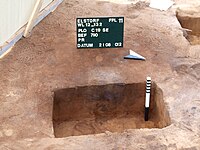SEADDA
This page documents a research project in progress.
Information may be incomplete and change as the project progresses.
Please contact the project lead before formally citing or reusing results from this page.
SEADDA Saving European Archaeology from the Digital Dark Age is a group of archaeologists and digital specialists working together to secure the future of archaeological data. This page is meant to coordinate the contribution of the Wikimedia community to the project, making sure that needs/requests from our community are taken into consideration in particular for the use and re-use of data. https://www.seadda.eu
Archaeological Data
[edit]Essentially the group focuses on four areas, corresponding to four working groups.
- Stewardship of Archaeological Data
- Planning for Archiving
- Preservation and Dissemination Best Practice
- Use and Re-use of Archaeological Data
The working group 4 related to use and Re-use of Archaeological Data aims at understanding how to optimise Archaeological archives and interfaces to maximise the use and re-use of archaeological data, and explore how archaeological archives can better respond to user needs, and ways to document and understand both quantitative and qualitative re-use.
Collaboration with the online collaborative communities (such as the Wikimedia projects and OpenStreetMap)
[edit]I want to make sure that the use and re-use of archaeological data is also possible on the Wikimedia projects and OpenStreetMap and that the needs/requests of the community are heard.
Archaeological Data on the Wikimedia projects and on OpenStreetMap
[edit]Preserving cultural heritage at risk online
[edit]- Connected Open Heritage. Preserving cultural heritage at risk online, and giving people easy access to it (2016-2017) is a major international project for preserving cultural heritage at risk online. It started a review of policies and institution in many countries. The research is not completed for each country but is an interesting starting point to understand the requests/needs of the online community, to support institutions working in the field of archaeology https://meta.wikimedia.org/wiki/Connected_Open_Heritage/Countries
- New Palmyra https://www.newpalmyra.org/. A project created by Bassel Khartabil focusing on Palmyra and now working in recostructing 3D models of destroyed heritage.
Collaboration with institutions related to archaeology (museums, organisations)
[edit]The online communities working on collaborative projects such as Wikipedia, the Wikimedia projects and OpenStreetMap call the heritage and cultural organisation with the acronym GLAM (galleries, libraries and they call these collaboration WikiGLAM or Open GLAMs (according to who is promoting these partnerships).
- Wiki Loves Monuments is a major yearly event focusing on cultural heritage and including archaeology.
- Partnership with UNESCO.
- Wikiexpeditions: events during which Wikipedia contributors visit a site, take photos of it, upload content on Wikimedia Commons and on Wikipedia and other Wikimedia projects.
- Editathon: events during which Wikipedia contributors edit Wikipedia and other Wikimedia projects.
| Country | Period | Institution | Activity | Link |
|---|---|---|---|---|
| Spain | 2012 | Archaeology Department of the City of Barcelona | Wiki Workshop | |
| Macedonia | 2015, 2016 | Archaeoexpeditions[1] | ||
| Spain | 2017 | National Archaeological Museum, Madrid | Meeting, Wikipedian in residence | Wikimedia Blog/Drafts/Three state museums open the doors to Wikimedia Spain/en |
| Spain | 2017 | Museo de Prehistoria de Valencia | Editathon Women and Archaeology, in Valencia[2] | |
| Spain | 2017 | blog colaborativo Arqueólogas e Historiadoras[3] | Editathon Women and Archaeology, in Valencia[2] | |
| Spain | 2012 | Archaeology Department of the City of Barcelona[4] | Wiki Workshop | |
| Spain | 2012 | Classical Archaeology Institute of Catalonia | Meeting | |
| Germany | 2011 | Wikipedia meets Antiquity / Wikipedia trifft Altertum[5] | Wikipedia trifft Altertum | |
| Italy | 2013 | Raccolte Extraeuropee del Castello Sforzesco di Milano
Fondazione Passaré Museo civico archeologico di Varese Civico Museo Goffredo Bellini di Asola Museo Archeologico G. Rambotti di Desenzano Civico Museo archeologico di Castelleone |
Project Archeowiki | https://it.wikipedia.org/wiki/Progetto:Archeowiki http://www.archeowiki.it/ |
| UK | 2019 | School of Archaeology - Univeristy of Oxford[6] | ||
| Jordan | 2019 | Open Jordanian Heritage. Edit-a-tho | ||
| International | 2010- (every year in September) | Wiki Loves Monuments am international photo contest about heritage | 
|
Contributing to Wikipedia on articles related to archaeology
[edit]WikiProjects are areas for focused collaboration among Wikipedians
| Language | Link | Notes |
|---|---|---|
| Italian | https://it.wikipedia.org/wiki/Progetto:Archeologia | |
| English | https://en.wikipedia.org/wiki/Wikipedia:WikiProject_Archaeology | |
| German | https://de.wikipedia.org/wiki/Wikipedia:WikiProjekt_Altertum | There is not wikiproject archaeology, but antiquities |
| French | https://fr.wikipedia.org/wiki/Projet:Arch%C3%A9ologie |
Adding images of archaeology to Wikimedia Commons
[edit]The major project related to archaeology is Wiki Loves Monuments which is a huge international photographic contest focusing on material heritage.
- An overview of archaeology on Wikimedia Commons https://commons.wikimedia.org/wiki/Archaeology
- All categories related to archaeology https://commons.wikimedia.org/wiki/Category:Archaeology
- Category for the museums https://commons.wikimedia.org/wiki/Category:Archaeological_museums
In 2008 a photo challenge was on Wikimedia Commons was about archaeology.
-
Spain
-
Mexico
-
Germany
-
Cambodia
-
Syria
-
Peru
-
Italy
Adding linked open data to Wikidata related to archaeology
[edit]Data can be related to monuments, sites, organisations, bibliography, documents, objects, images...
- WikiProject Archaeology on Wikidata https://www.wikidata.org/wiki/Wikidata:WikiProject_Archaeology
- Cultural projects on Wikidata https://www.wikidata.org/wiki/Category:Cultural_WikiProjects
- Organisations https://www.wikidata.org/wiki/Category:WikiProjects_for_organizations and GLAM https://www.wikidata.org/wiki/Category:GLAM_WikiProjects
- Cultural heritage https://www.wikidata.org/wiki/Category:WikiProject_Cultural_heritage
- Numismatics https://www.wikidata.org/wiki/Category:WikiProject_Numismatics
- Libraries https://www.wikidata.org/wiki/Category:WikiProject_Libraries
- Wiki Loves Monuments (with the entire catalogue of monuments – material heritage cultural and natural – of the world) https://www.wikidata.org/wiki/Wikidata:WikiProject_WLM and https://www.wikidata.org/wiki/Category:WikiProject_WLM
- History https://www.wikidata.org/wiki/Category:History_WikiProjects
Organisation
[edit]The group involves 100 members from 31 European countries and from Argentina, Canada, Japan and the Unites States. The network has been established as a COST Action[7], a European programme which supports international networks aiming at designing research projects.
- Liaison for the Wikimedia and OpenStreetMap community: Iolanda Pensa
References
[edit]- ↑ Shared Knowledge/Projects/Archaeoexpeditions
- ↑ a b Wikipedia:Encuentros/Editatona Mujeres y Arqueología
- ↑ http://arqueologasehistoriadoras11feb.blogspot.com/
- ↑ Amical Wikimedia/July 2012
- ↑ Wikipedia trifft Altertum
- ↑ https://twitter.com/LisaLodwick/status/1085538716599402498
- ↑ Description of COST Actions https://www.cost.eu/cost-actions/what-are-cost-actions/.













